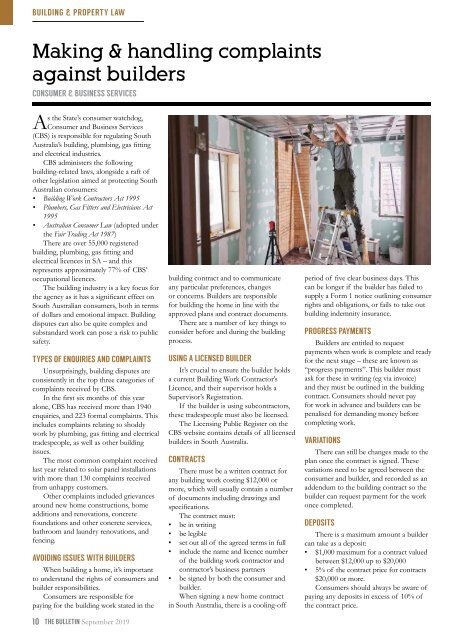LSB September 2019_Web
You also want an ePaper? Increase the reach of your titles
YUMPU automatically turns print PDFs into web optimized ePapers that Google loves.
BUILDING & PROPERTY LAW<br />
Making & handling complaints<br />
against builders<br />
CONSUMER & BUSINESS SERVICES<br />
As the State’s consumer watchdog,<br />
Consumer and Business Services<br />
(CBS) is responsible for regulating South<br />
Australia’s building, plumbing, gas fitting<br />
and electrical industries.<br />
CBS administers the following<br />
building-related laws, alongside a raft of<br />
other legislation aimed at protecting South<br />
Australian consumers:<br />
• Building Work Contractors Act 1995<br />
• Plumbers, Gas Fitters and Electricians Act<br />
1995<br />
• Australian Consumer Law (adopted under<br />
the Fair Trading Act 1987)<br />
There are over 55,000 registered<br />
building, plumbing, gas fitting and<br />
electrical licences in SA – and this<br />
represents approximately 77% of CBS’<br />
occupational licences.<br />
The building industry is a key focus for<br />
the agency as it has a significant effect on<br />
South Australian consumers, both in terms<br />
of dollars and emotional impact. Building<br />
disputes can also be quite complex and<br />
substandard work can pose a risk to public<br />
safety.<br />
TYPES OF ENQUIRIES AND COMPLAINTS<br />
Unsurprisingly, building disputes are<br />
consistently in the top three categories of<br />
complaints received by CBS.<br />
In the first six months of this year<br />
alone, CBS has received more than 1940<br />
enquiries, and 223 formal complaints. This<br />
includes complaints relating to shoddy<br />
work by plumbing, gas fitting and electrical<br />
tradespeople, as well as other building<br />
issues.<br />
The most common complaint received<br />
last year related to solar panel installations<br />
with more than 130 complaints received<br />
from unhappy customers.<br />
Other complaints included grievances<br />
around new home constructions, home<br />
additions and renovations, concrete<br />
foundations and other concrete services,<br />
bathroom and laundry renovations, and<br />
fencing.<br />
AVOIDING ISSUES WITH BUILDERS<br />
When building a home, it’s important<br />
to understand the rights of consumers and<br />
builder responsibilities.<br />
Consumers are responsible for<br />
paying for the building work stated in the<br />
building contract and to communicate<br />
any particular preferences, changes<br />
or concerns. Builders are responsible<br />
for building the home in line with the<br />
approved plans and contract documents.<br />
There are a number of key things to<br />
consider before and during the building<br />
process.<br />
USING A LICENSED BUILDER<br />
It’s crucial to ensure the builder holds<br />
a current Building Work Contractor’s<br />
Licence, and their supervisor holds a<br />
Supervisor’s Registration.<br />
If the builder is using subcontractors,<br />
these tradespeople must also be licensed.<br />
The Licensing Public Register on the<br />
CBS website contains details of all licensed<br />
builders in South Australia.<br />
CONTRACTS<br />
There must be a written contract for<br />
any building work costing $12,000 or<br />
more, which will usually contain a number<br />
of documents including drawings and<br />
specifications.<br />
The contract must:<br />
• be in writing<br />
• be legible<br />
• set out all of the agreed terms in full<br />
• include the name and licence number<br />
of the building work contractor and<br />
contractor’s business partners<br />
• be signed by both the consumer and<br />
builder.<br />
When signing a new home contract<br />
in South Australia, there is a cooling-off<br />
period of five clear business days. This<br />
can be longer if the builder has failed to<br />
supply a Form 1 notice outlining consumer<br />
rights and obligations, or fails to take out<br />
building indemnity insurance.<br />
PROGRESS PAYMENTS<br />
Builders are entitled to request<br />
payments when work is complete and ready<br />
for the next stage – these are known as<br />
“progress payments”. This builder must<br />
ask for these in writing (eg via invoice)<br />
and they must be outlined in the building<br />
contract. Consumers should never pay<br />
for work in advance and builders can be<br />
penalised for demanding money before<br />
completing work.<br />
VARIATIONS<br />
There can still be changes made to the<br />
plan once the contract is signed. These<br />
variations need to be agreed between the<br />
consumer and builder, and recorded as an<br />
addendum to the building contract so the<br />
builder can request payment for the work<br />
once completed.<br />
DEPOSITS<br />
There is a maximum amount a builder<br />
can take as a deposit:<br />
• $1,000 maximum for a contract valued<br />
between $12,000 up to $20,000<br />
• 5% of the contract price for contracts<br />
$20,000 or more.<br />
Consumers should always be aware of<br />
paying any deposits in excess of 10% of<br />
the contract price.<br />
10<br />
THE BULLETIN <strong>September</strong> <strong>2019</strong>


















